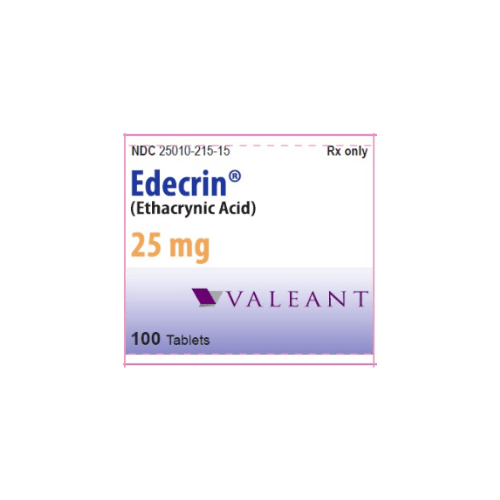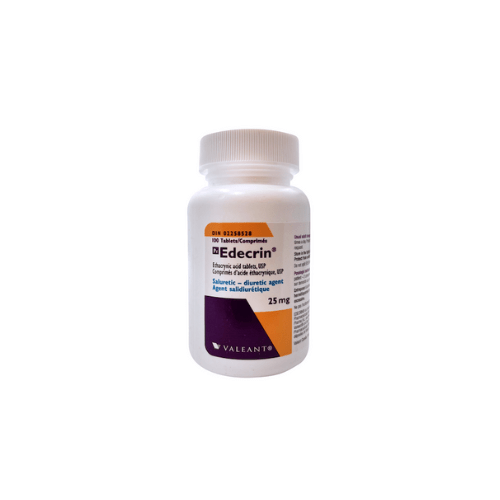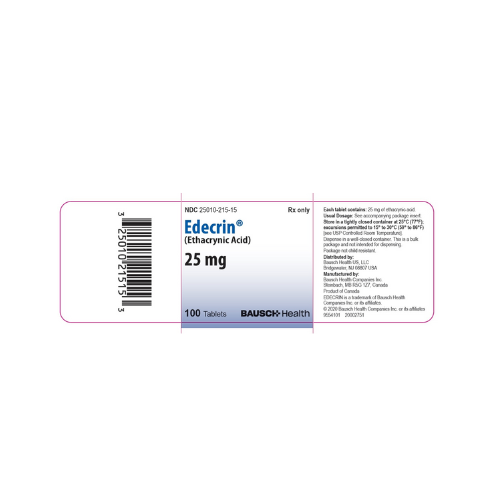Please note: a valid prescription is required for all prescription medication.
Edecrin (ethacrynic acid) is a prescription diuretic medication used to treat fluid retention (edema) caused by conditions such as heart failure, liver disease, or kidney disorders. It works by helping the kidneys eliminate excess salt and water, reducing swelling and improving symptoms related to fluid overload.
Benefits:
- Effectively reduces swelling caused by fluid retention.
- Helps improve breathing and mobility in individuals with edema.
- Offers a treatment option for patients who cannot tolerate other diuretics.
- Suitable for managing edema in various medical conditions.
Dosage:
- Initial dose is typically 50 mg taken orally once or twice daily.
- Dosage can be adjusted by your healthcare provider based on your condition and response.
- Maximum daily dose should not exceed 200 mg.
Usage Instructions:
- Take Edecrin as directed by your healthcare provider, preferably with food or milk to reduce stomach upset.
- Follow the prescribed dosing schedule consistently.
- Drink plenty of fluids unless otherwise instructed by your doctor to avoid dehydration.
- Regularly monitor your weight and report significant changes to your healthcare provider.
Storage Information:
- Store at room temperature, away from moisture and direct light.
- Keep the bottle tightly closed and out of reach of children and pets.
Warnings and Precautions:
- Not recommended for individuals with severe electrolyte imbalances or anuria (inability to urinate).
- Use cautiously if you have kidney or liver impairment.
- May cause dehydration or low potassium levels; regular monitoring is essential.
- Inform your doctor about all other medications, supplements, and medical conditions to avoid potential interactions.
- Not suitable for use during pregnancy unless specifically prescribed.
Common Side Effects:
- Nausea, vomiting, or stomach discomfort.
- Dizziness or lightheadedness, especially when standing up quickly.
- Increased urination, which may lead to dehydration if fluids are not replenished.
- Muscle cramps or weakness due to electrolyte imbalances.
Express Shipping - from $25.00
Shipping with this method takes 3-5 days
Prices:
- Dry-Packed Products $25.00
- Cold-Packed Products $35.00
Standard Shipping - $15.00
Shipping with this method takes 5-10 days
Prices:
- Dry-Packed Products $15.00
- Not available for Cold-Packed products
What is Edecrin used for?
What is Edecrin used for?
Edecrin is used to treat fluid retention (edema) associated with heart failure, liver cirrhosis, and kidney disorders.Can I take Edecrin with other diuretics?
Can I take Edecrin with other diuretics?
In some cases, your doctor may combine Edecrin with other diuretics, but this should only be done under medical supervision.What should I do if I miss a dose?
What should I do if I miss a dose?
If you miss a dose, take it as soon as possible. If it is close to your next scheduled dose, skip the missed dose and resume your regular schedule.Is Edecrin safe for long-term use?
Is Edecrin safe for long-term use?
Long-term use may be safe under medical supervision, but regular monitoring of electrolytes and kidney function is essential.Can I drink alcohol while taking Edecrin?
Can I drink alcohol while taking Edecrin?
Alcohol may increase the risk of dizziness or dehydration. It’s best to limit or avoid alcohol while using this medication.
Rewards Program
Earn points on birthdays, product orders, reviews, friend referrals, and more! Enjoy your medication at unparalleled discounts while reaping rewards for every step you take with us.
You can read more about rewards here.
POINT VALUE
How to earn points
- 1Create an account and start earning.
- 2Earn points every time you shop or perform certain actions.
- 3Redeem points for exclusive discounts.





